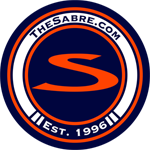There may have been no unit that I enjoyed watching last year as much as the defensive line. Why? Because after a season of development, we may have no unit with more upside going into next season. Barring injury, I believe that Chris Long , Jeffrey Fitzgerald , and Nate Collins represent the best returning unit of the Al Groh era. With that in mind, let’s look at Things I Learned About The Defensive Line.
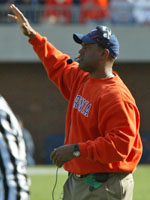 |
|
Mike London’s arrival seemed to help the defensive line.
|
The Year In Review. In my opinion, the defensive line was the steadiest unit on the defense during the 2006 season. Every unit will have good games and not-so-good games, but the range between those two seemed a lot smaller for the defensive line than for any other unit on the defense. When you break down the personnel, it really is not hard to figure out why.
What does Groh’s (and London’s) version of the 3-4 need from the defensive line? I could spout a long list of attributes that you would want from the linemen but, if you have to get it down to one simple explanation, I would say that you have to have linemen that can draw double teams and at times beat those double teams. You do not need every lineman to be able to do that on every play, but you had better have linemen that can do it more than occasionally.
In the past, we have had some linemen that could do that. Chris Canty is the most obvious example. Brennan Schmidt could do it at times, too, but he struggled more without Canty across from him. Andrew Hoffman was better in this regard than many realized. But never before during the Groh era have we been able to line up three linemen that can measure up to the standard. Now, I think we do in Long, Fitzgerald, and Collins. And I think we saw the results of that on the field this year, both in terms of the production we got from the defensive line itself and from the production we got from other units.
The focus going forward is going to remain on Long, Fitzgerald, and Collins. That is not to understate the importance to the defensive line of other contributors. Allen Billyk , for example, started several games, was third among the linemen in tackles, and generally gave a workman-like effort in the middle of the line; he will be expected to provide the same next year, too. Keenan Carter never quite measured up to his potential, but he pitched in.
Kevin Crawford flashed his potential at times in practices – he has the physical tools – and remains in the mix for playing time going forward. Sean Gottschalk seemed to turn the corner in practices mid-way through the season, and certainly will push for snaps early next year. We may even have a surprise or two among guys who switch positions, next year or the year after. But Long, Fitzgerald, and Collins are the three that defined the play of the defensive line this past season, and they are the three that will do so next season.
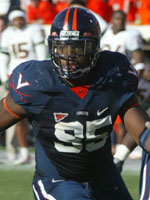 |
|
Jeffrey Fitzgerald emerged as a star on the D-Line.
|
A Reason For Excitement. Going into the 2006 season, I was convinced that if Fitzgerald could stay healthy – never a sure thing for him in the past – he was going to flash star potential. I was wrong. Fitzgerald did more than flash star potential. He made star plays. Big hits. Sacks (leading the team in sacks, in fact). Interceptions. Touchdowns. Simply put, Mr. Fitzgerald arrived on the scene in a big way, and the league took notice.
There are a lot of reasons for Fitzgerald’s success. He prepares. He plays hard and plays smart. He has great footwork. He has a good feel for the game. He has good height and length, but still plays with pretty good leverage. But game after game, I tend to focus on how good his hands are. I think that hand play is an often overlooked skill among defensive linemen. Bad hands sunk Kwakou Robinson, for example. Fitzgerald, on the other hand, has fantastic hands.
Fitzgerald is a guy that could have been a top-flight tight end – he was in high school – but having good receiving hands does not always mean that good hands will translate to defense. We are not talking about exactly the same skill, after all. But with Fitzgerald, it does. Fitzgerald does a great job getting his hands into the defender and getting extension. Once he has his hands on the blocker, Fitzgerald is going to make the play more often than not, as he does a great job controlling the blocker with his hands, keeping his base under control, and shedding the block. And when it gets right down to it, if you cannot shed the block, you cannot make the tackle.
When you go back and watch tape of Fitzgerald’s play last year and watch his technique – and the results – it is easy to forget that you are looking at his first year on the field.
Which, of course, leads me into another rant …
A Wasted Year Or Two. From time to time, I have written about what I consider to be some ill-advised redshirt decisions during the Groh era. Admittedly, the 2006 season was a major departure from past redshirting practice, as the entire incoming class save Nate Collins (discussed below) kept their shirts on. And yet, one past redshirt decision continues to gnaw at me above all others. Alex Field .
Now two years into his UVA career, Field has little production on the field to point to. Last year? Ten total tackles (five solo) and a sack. So why am I on a rant about a kid that has not been that productive on the field? Because I do not think it had to be that way.
Projecting how talent will translate from the high school level to the ACC level is never easy. There are hits and misses all the time. But when I watched Alex Field in high school, I was convinced that we had found a gem. I think Field was vastly underrated coming out of Broad Run. Field was a high motor player that gave tremendous effort on each snap on both sides of the ball, but I was particularly impressed by his effectiveness on the defensive line. Field showed an excellent feel for the game, and was almost impossible to block with one blocker (often, with two). I was convinced that we were looking at a two-year (maybe even three) starter in Field, and was thrilled when he was slotted at DE on his arrival on grounds.
Field did well in his early practices at UVa … perhaps, too well. In an effort to “accelerate” his development, to get him more ready for increased snaps and increased playing time in 2006, the redshirt was taken off Field and he was thrown into the action. But not much. A snap here and there. But no one – and I mean no one – can credibly argue that Field impacted wins and losses in the 2005 season.
Then came 2006, and the arrival of Jeffrey Fitzgerald . Shockingly – a bit of sarcasm there – Fitzgerald overcame the fact that he redshirted in 2005 and thus did not have the same chance to “accelerate” as Field did. Fitzgerald leaped over Field on the depth chart and, with Fitzgerald and Long both doing ironman acts this year, snaps for Field were few and far between.
Field now enters his third year in the program, and UVa has received little return on its investment. But I remain convinced that the lack of return is not due to the fact that Field cannot perform at a high level. I think he can. In fact, I have little doubt about that fact. I think that Field is stuck a year behind his natural development curve. Maybe my view is skewed due to the fact that Alex is as nice a kid as you could hope to meet. Maybe. But I don’t think so.
Having said that, maybe Field still will get his shot. Perhaps he will end up doing so on the offensive line, after a redshirt year and a chance to bulk up into an offensive tackle. That certainly is a possibility, and there are a lot of people that thought Field should have been slotted on the offensive line right out of high school. Maybe a strong finish with offensive line recruits in the 2007 class will mean that Field stays on the defensive line and have a shot at succeeding Long for at least a year. Maybe a mid-career redshirt is in the offing – it will have to be if he shifts once and for all to the offensive line – maybe not. But one way or the other, I suspect that seeing Field will always cause me to say, “What if … ?”
That’s my rant. Having given a mini-rant on Mo Covington a short time ago, and a full-length rant on Field this week, I will try to refrain from future rants on the subject. Oh, wait, linebackers are up next week? Maybe a mini-rant on Aaron Clark will be required before I go cold turkey …
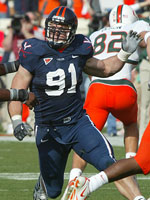 |
|
Chris Long needs to finish more plays when he pressures the opposing quarterback.
|
Sometimes, You Just Have To Slow Down. Play in, play out, Chris Long goes full bore, 110%, pedal to the floor. That is certainly one of the attributes that makes him such a fan favorite (his talent might have something to do with it, too). But for Long to have as productive a senior year as his talent would indicate is possible – and I admit that I will sweat through the date for juniors to declare for the NFL Draft – he needs to learn that sometimes, going 110% does not mean always running as fast as one can.
I have not tried to break down the statistics – why do I feel that I just waved a red cape in front of VBHOO? – but I have trouble imagining that there was a player in the ACC that has had a bigger gap between the number of quarterback pressures and the number of quarterback sacks. Time and time again, Long seems to break through the blockers but fail to wrap up the quarterback. Sometimes, he is a step late, but that is just going to happen at times. Far too often, however, Long seems to beat the block and be there to make the sack, only to have the quarterback step around him and make a play. Why does that occur? I have a theory.
Watching Long last season, it appeared to me that he often was out of control when he is approaching the quarterback, running full steam ahead and failing to break down and get himself under control before trying to wrap up the quarterback. That can result in some big hits, but it also means that Long is vulnerable to a simple side-step by the quarterback. We saw that plenty over the last two seasons, with Long often getting an arm on the quarterback back falling past with too much momentum to wrap up.
For Long to reach his full potential next year, I think the key is to find the balance between playing full speed and playing under control. Yes, you go full speed to beat the blockers. Yes, you go hard after the quarterback. But as you get there, you break down, you get your base set, and you get a square hit on the quarterback. Maybe not a huge hit, but you get the quarterback on the ground.
Slowing down is not an easy thing to do, particularly for a high motor guy like Long. But I do not think I will be the one to lose money by betting on Long to get this right.
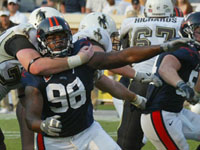 |
|
Nate Collins contributed as a true freshman along the defensive front.
|
A Changing Of The (Nose) Guard. An awful play on words, I admit – particularly since I swapped out “tackle” for “guard” – but there was nothing awful about the play of Nate Collins this season. And the slotting of Collins at the nose tackle slot was a clear indication that, when compared to the recruits we previously have sought for the middle of the defensive line, Mike London has a different vision for the future of the position.
Nothing highlights my point more than Nate Collins ‘ sack in the first quarter of the Virginia Tech game, a play I broke down in the “10 Things” post-game article. Simply put, there is no way that we run that stunt in that manner in the past because, simply put, our prior nose tackles could not have executed that stunt in that manner. On that play, Collins was the lineman with the responsibility for the sprint at the quarterback. Can you see Keenan Carter making that sprint? Collins gives London options on the line that we just have not had in the past, and he should only be more productive with another year under his belt.
Nick Jenkins can be a similar option at the nose tackle slot. He may not have the straight line speed of Collins, but he is very nimble with his weight in the right range and has the potential to be a very effective lineman in London’s system. In fact, I suspect that we will have the chance to see Jenkins try to capitalize on that potential sooner rather than later – as giddy as London is about Jenkins’ talent, and given the fact that Carter is moving on, I expect Jenkins to be in the nose tackle rotation next season along with Collins and Billyk.
Now, I am as big a proponent as you will find for redshirting every first year possible. But having said that, I was wrong about Collins this past season – he was ready, and he contributed important snaps. Here’s hoping that Jenkins is similarly ready.
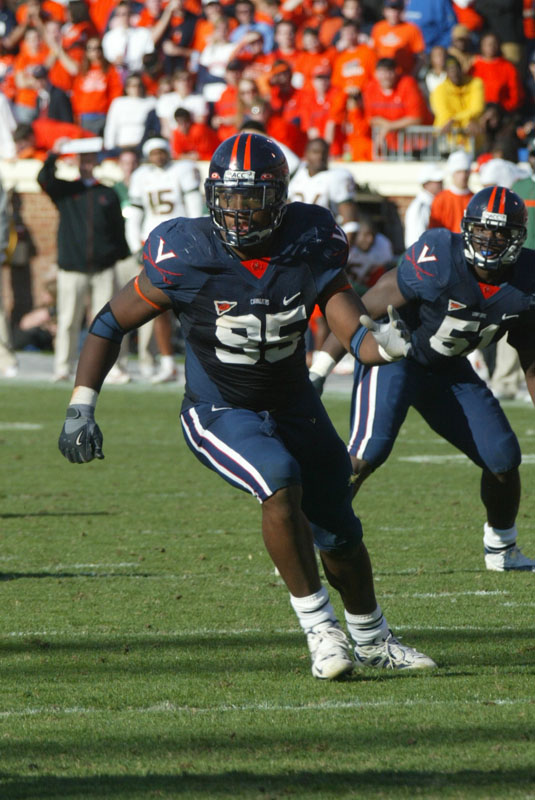 Cross-posting for the feed readers: JHoo’s must-read analysis of the 2006 UVa Defensive Line (
Cross-posting for the feed readers: JHoo’s must-read analysis of the 2006 UVa Defensive Line (![]() ).
).![]() )Â
)Â ![]() )Â
)Â ![]() )Â
)Â ![]() )
) 
